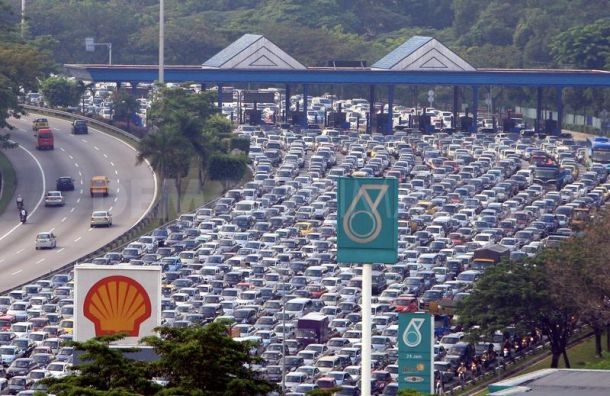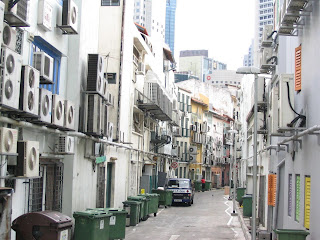Singapore's successful urban-planning policies ought to be emulated by Malaysia |
I'm attempting to make the most of my procrastination by producing a coherent and legible blog post - one that is long overdue as well. With two papers waiting to be completed, I would hardly try to make this post anything like an essay, but it normally turns out to be like one, so I've heard. So, hopefully I'll try to write in a relaxed manner without betraying the gravity of the content, namely, that the disparities between the Malaysian and Singaporean state are so great as to provoke sadness and sympathy within me. As a Malaysian citizen, the Singaporean developmental, economical and political model is to be emulated, if Malaysia wishes to meet its 2020 goal of being a high-income economy. In today's post, I will elaborate on the different developmental practices in both countries.
 |
Pedestrian Sky-bridges amidst lush, green growth in Singapore |
Sustainable, efficient, durable development
Quite simply, the urban-planning in Singapore is superior in terms of sustainability, efficiency and durability. What I mean by durability is that infrastructure is laid out with considerations or measures of maintenance for long-term preservation. Construction projects are well-funded by both the government and private investment, ensuring that no project comes to a standstill half way through. Needless to say, controlled housing development; the scarcity of land and strict governmental legislation have facilitated Singapore's growth. Not only are the development practices environmentally friendly, many businesses promote sustainability by imposing hefty surcharges. Case in point, land reclamation policies in Singapore account for its environmental impact and attempt to counteract against it by heavily restricting such activities; while ensuring that reclaimed land developers exercise some form of conservation by planting greeneries and parks on these lands.
 |
Even with its extensive networks of freeways and highways, Malaysian citizens, especially around KL, enduresevere traffic congestions which consume productivity and resources. |
In terms of efficiency, Malaysia needs to develop its townships to maximize public transport usage and minimize traffic congestion. This is done by first linking newly urbanized areas to the extensive public transit networks already present in Malaysia, and then making sure that the frequency and services of trains, buses or light-rail are dependable enough to reduce the number of private cars on the streets. If Malaysia applies the Singaporean urban renewal and controlled development models to its numerous city centres such as in certain districts within KL, Penang, Johore, Shah Alam etc, efficiency through fossil fuel conservation and the reduction of pollution could definitely be realized.
The Clean Singaporeans and Dirty Malaysians
 |
'Green' architecture are ubiquitous in the micro-state of Singapore. |
 |
| Backalley - Malaysia |
 |
| Backalley - Singapore |
Beautification and landscaping are basically non-existent in Malaysia, but how is it that Singapore out-performs a country with a bigger workforce, a bigger economy with more resources in these small but important details? Surely, we could have more people keeping our streets and neighbourhoods clean; or repaint the apartments. Surely, we can be cleaner than we are. Malaysia shares common ties of kinship, ethnicity and history with Singapore, and I would assert that our moral principals and values are on the same trajectory. Malaysia and Singapore differ little in its developmental capacities, in fact, I would argue that Malaysia has much more potential because of its size and resources to out-class our southern neighbour in urban-planning but we are lacking in every respect.
On Public Washrooms and Clogged Drains
 |
Public washroom cubicles like these are a common sight in Malaysia |
Is it because of divergent civic values? That Singaporeans are inherently cleaner or have a more civic sense of collective responsibility? I find it ridiculous to think that Malaysians are just dirtier than Singaporeans, nor would I find it intelligent for a Singaporean to perceive themselves as cleaner than Malaysians. Where Malaysians differ from Singaporeans, however, is in their capacity for civic awareness. Malaysians simply care less about public hygiene or traffic congestion and there is an endemic of blame and 'finger pointing'. Not only do we suffer from a collective action problem, we engage in blatant name-calling and racism when it comes to finding a scape goat for our systemic development problems. The Chinese would blame the Malays for clogging drains or making a dirty mess in washrooms and vice versa. The Chinese driver would angrily call out poor Indian drivers and so forth. Sure, these are pedestrian-level encounters but they reveal a fragmented civil society.
How can we raise our capacity for civic values? Better education. We must indoctrinate our youth in sound hygiene practices and lead by example at home. I think cleanliness is an excellent way to begin a nation-wide movement towards sustainable development. There has to be a cultural paradigm shift that nurtures the relationship between the individual and the state; the family and nation. What I do at home will be the same as what I will do in public, and will be what I expect from the State. I do not clog my drain, I dislike sound pollution and I choke at diesel gas fumes. Thus, expectations and standards will be raised, as more money and government attention would be diverted to sustainability and other developmental perks derived from sound-personal habits will follow.
In the next post, I will deal with efficient infrastructure and how Malaysia could vastly improve its internal transportation system.

Comments
Post a Comment